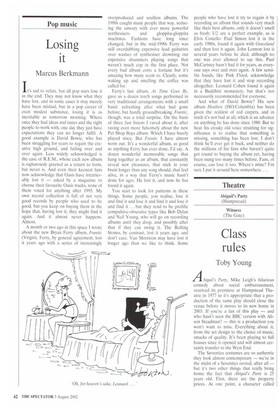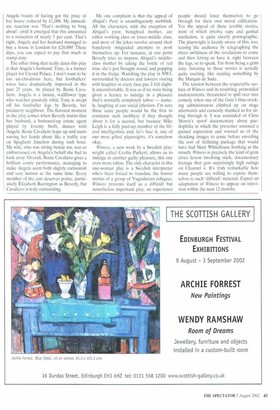Theatre
Abigail's Party (Hampstead)
Witness (The Gate)
Class rules
Toby Young
Abigail's Party, Mike Leigh's hilarious comedy about social embarrassment, received its premiere at Hampstead Theatre in 1977 so it's appropriate that a production of the same play should close the venue before it moves to its new home in 2003. If you're a fan of this play — and who hasn't seen the BBC version with Alison Steadman? — this is a production you won't want to miss. Everything about it, from the set design to the choice of music, smacks of quality. It's been playing to full houses since it opened and will almost certainly transfer to the West End.
The Seventies costumes are so authentic they look almost contemporary — we're in the midst of a Seventies revival, after all — but it's two other things that really bring home the fact that Abigail's Party is 25 years old. First, there are the property prices. At one point, a character called Angela boasts of having got the price of her house reduced by £1,000. My immediate reaction was 'That's nothing to brag about', until it emerged that this amounted to a reduction of nearly 5 per cent. That's right, Angela and her husband managed to buy a house in London for £20,000! These days, you can expect to pay that much in stamp duty.
The other thing that really dates this play is that Angela's husband, Tony, is a former player for Crystal Palace, I don't want to be too un-chivalrous here, but footballers' wives have dramatically improved in the past 25 years. As played by Rosie Cavaliero, Angela is a mousy, wallflower type who watches passively while Tony is swept off his footballer legs by Beverly, her predatory neighbour. The funniest moment in the play comes when Beverly insists that her husband, a buttoned-up estate agent played by Jeremy Swift, dances with Angela. Rosie Cavaliero leaps up and starts waving her hands about like a traffic cop on Spaghetti Junction during rush hour. My wife, who was sitting beside me, was so embarrassed on Angela's behalf she had to look away. Overall, Rosie Cavaliero gives a brilliant comic performance, managing to make Angela seem both slightly cartoonish and very human at the same time. Every member of the cast deserves praise, particularly Elizabeth Barrington as Beverly, but Cavaliero is truly outstanding. My one complaint is that the appeal of Abigail's Party is unambiguously snobbish. All the characters, with the exception of Abigail's poor, benighted mother, are either working class or lower-middle class, and most of the jokes revolve around their hopelessly misguided attempts to posh themselves up. For instance, at one point Beverly tries to impress Abigail's middleclass mother by taking the bottle of red wine she's just brought round and popping it in the fridge. Watching the play in NW3, surrounded by doctors and lawyers roaring with laughter at every faux pas, I felt slightly uncomfortable. It was as if we were being given a licence to indulge in a pleasure that's normally completely taboo — namely, laughing at our social inferiors. I'm sure these same people would be the first to condemn such snobbery if they thought about it for a second, but because Mike Leigh is a fully paid-up member of the liberal intelligentsia and, let's face it, one of our most gifted playwrights, it's somehow okay.
Witness, a new work by a Swedish playwright called Cecilia Parkert, allows us to indulge in another guilty pleasure, this one even more taboo. The only character in this one-woman play is a Swedish interpreter who's been forced to translate the horror stories of a group of Yugoslavian refugees. Witness presents itself as a difficult but nonetheless important play, an experience people should force themselves to go through for their own moral edification. Yet the appeal of these terrible stories, most of which involve rape and genital mutilation, is quite clearly pornographic. The playwright is keenly aware of this, too, teasing the audience by telegraphing the sheer awfulness of the revelations to come and then letting us have it, right between the legs, so to speak. Far from being a grim duty, listening to these stories is actually quite exciting, like reading something by the Marquis de Sade.
The tension between the respectable surface of Witness and its troubling, primordial undercurrents, threatened to spill over into comedy when one of the Gate's blue-stacking administrators climbed up on stage afterwards and earnestly thanked us for sitting through it. I was reminded of Chris Morris's spoof documentary about paedophilia in which the presenter assumed a pained expression and warned us of the shocking images to come before unveiling the sort of titillating package that would have had Mary Whitehouse frothing at the mouth. Witness is precisely the kind of grim civics lesson involving stark, documentary footage that gets surprisingly high ratings on Channel 4. It's truly remarkable how many people are willing to expose themselves to such 'difficult' material. Expect an adaptation of Witness to appear on television within the next 12 months.



























































 Previous page
Previous page